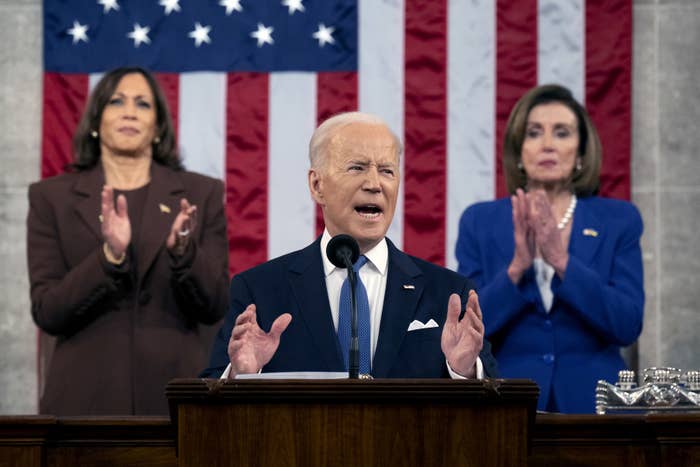
As the world enters a third year of the COVID-19 pandemic, President Joe Biden said the US is “moving forward safely” in his State of the Union address on Tuesday night, painting a picture of cautious optimism about dealing with the virus in the coming months.
“I know some are talking about ‘living with COVID-19.’ Tonight, I say that we will never just accept living with COVID-19,” he said, delivering his address in a chamber full of lawmakers not wearing masks after masking requirements on Capitol Hill were dropped ahead of the speech. On Friday, the Centers for Disease Control and Prevention dropped its guidelines strongly recommending masks indoors for most of the country.
Nationally, COVID cases are slowing down after the massive surge driven by the Omicron variant through the past few months, with the exceptions of pockets of the country with low vaccination rates, where cases and hospitalizations largely remain higher. And despite the progress that’s been made, roughly 1,800 Americans are still dying of the virus every day.
Though he stopped short of declaring that the US has entered a phase of the crisis where COVID-19 could be considered endemic, Biden sought to emphasize returning to somewhat normal life. “COVID-19 need no longer control our lives,” he said.
The White House is expected to release a new plan on Wednesday morning outlining the next phase of the COVID-19 response. That will follow the general blueprint Biden laid out on Tuesday night, according to a White House official. The president made four points on the next phase of the pandemic: continuing to encourage vaccines and making antiviral treatments more widely available, preparing for new variants, getting people back to schools and workplaces, and providing vaccines for other parts of the world.
“For the past six to eight weeks we’ve been meeting with outside public health officials, governors, and getting all of their inputs,” said the White House official, adding that the strategy will include protections for immunocompromised people, like ensuring they can receive a fourth shot of the vaccine and plans to prevent mass closures of offices and schools in the event of a new variant.
The administration plans to provide antiviral drugs on the spot — 1 million pills in March and double that in April — to people who test positive at hundreds of pharmacy clinics and supermarket pharmacies across the country.
Biden was both more positive and more measured on the pandemic than in his first address to Congress, perhaps a reflection on the ups and downs of the past year, which saw an improvement in cases and hospitalizations over the summer and a drastic turn for the worse through fall and winter.
In December, at the height of the Omicron variant, the White House came under criticism from some public health experts for its slow rollout of rapid tests and N95 masks. Biden said on Tuesday the administration expects to be ready to send out new vaccines within 100 days if a new variant emerges that requires one. He added that he hopes to have stockpiles of tests, masks, and antiviral pills if Congress approves funding.
“I cannot promise a new variant won’t come, but I can promise you we’ll do everything within our power to be ready if it does,” he said.
Some public health experts say Biden’s shift toward trying to ease some COVID-19 guidelines makes sense in practical terms because case rates are going down in many parts of the country, and they believe the places with the lowest masking compliance are unlikely to be swayed either way by what the federal government recommends.
In previous addresses to the nation on the pandemic, Biden took the opportunity to speak directly to those Americans who have resisted getting vaccinated against the virus. On Tuesday, he seemed to hit that message less directly: “We know how incredibly effective vaccines are. If you’re vaccinated and boosted, you have the highest degree of protection. We will never give up on vaccinating more Americans,” he said, and added that the virus should not be “a partisan dividing line.”
Matthew Seeger, a health and risk communication scholar at Wayne State University, said that reaching those Americans is going to take more than a message from Biden or the CDC, given the lack of trust in official sources and scientific authorities among unvaccinated Americans.
“I think that that is a much longer-term problem,” he said.
Dr. Jennifer Nuzzo, a professor at the Johns Hopkins Center for Health Security, said it was important for Biden to set expectations that things could change and that restrictions could come back into place if necessary. She added that one thing that has been missing from public discourse — which Biden did not allude to on Tuesday night — is getting people used to the idea that we live in a world where pandemics are just more likely to happen and preparing for that, rather than seeing this as a once-in-a-lifetime event.
“I think masks remain an important tool, and I think that we should continue to avail ourselves of the benefits of masks,” Nuzzo said. “But I think the fact of the matter is, the places where I worry about most in the country are places that haven't been masking by way of mandate since August.”
Dan Vergano contributed reporting to this story.
